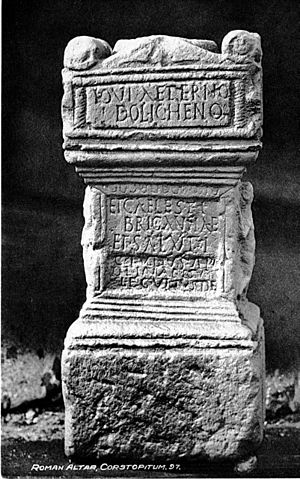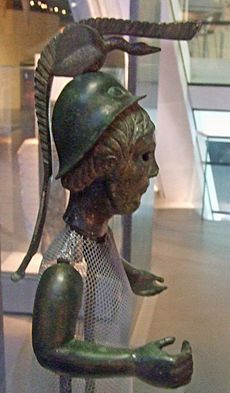Brigantia (goddess) facts for kids
Brigantia was an important goddess in the ancient Celtic religion. People in areas like Gaul (which is now France) and Britain worshipped her. She was sometimes seen as similar to Roman goddesses such as Minerva (goddess of wisdom and war), Tyche or Fortuna (goddess of luck), and Victoria (goddess of victory). Some stories about the Irish figures Brigid and Saint Brigid might be connected to Brigantia, but they are still different characters.
Contents
What Brigantia's Name Means
Brigantia's name comes from an old Celtic word, *brigantī. This word means "The High One." It is related to other ancient words that also mean "high" or "exalted." For example, the Old Irish name Brigit and the Sanskrit word Bṛhatī, which is an epithet for the Hindu dawn goddess Ushas, share this root.
Finding Evidence of Brigantia
We know about Brigantia from different sources across the Celtic world. These include old writings and statues.
Ancient Inscriptions

Archaeologists have found eight inscriptions dedicated to Brigantia in Britain. These inscriptions are like ancient messages carved into stone.
One inscription was found at Birrens in Scotland. It says that a person named Amandus, an architect, made an offering to Brigantia because she commanded it.
Two inscriptions connect Brigantia with the Roman goddess Victoria. One was found in Castleford and another in Greetland, both in Yorkshire, England. The Greetland inscription might be from the year 208 CE. It mentions that Titus Aurelius Aurelianus gave a gift to "Goddess Victoria Brigantia" for himself and his family.
In Adel, an altar was discovered with the words "To the Goddess Brigantia, Cinge Tissa placed this gift."
At Corbridge on Hadrians Wall, an inscription calls her "Heavenly Brigantia" (Caelestis Brigantiae). She is also mentioned alongside Jupiter Dolichenus, a Roman god popular with soldiers. This shows that Roman soldiers sometimes worshipped Celtic gods too.
Another inscription found in Irthington, Cumbria, refers to her as "the divine nymph Brigantia."
Some inscriptions simply say "To the Goddess Brigantiae." There is also one inscription that calls her "Tutela Brigantia Augusta," which means "Protector Brigantia Augusta."
Some ancient coins from the Celtiberians (an ancient people in Spain) also have a word that sounds like "Brigantia." This suggests there might have been a similar goddess in that region.
Statues and Art
A statue found in Brittany, France, seems to show Brigantia. This statue has features similar to the Roman goddess Minerva. This helps us identify her in ancient art.
Places Named After Brigantia
Many places have names that come from Brigantium, which is a form of the same word as Brigantia. These names often mean "high fort" or "high place." However, it is not always certain if these places were directly named after the goddess herself or just describe a high location.
Some towns that might have preserved her name include:
- Brigetio in Hungary.
- Briançonnet and Briançon in France. Briançon was called Brigantio in ancient times.
- Bragança in Portugal. Its people are still called brigantinos today.
- Braga in Portugal.
- A Coruña and Betanzos in Spain.
According to an old Irish book called Lebor Gabála Érenn, a hero named Breogán founded a city called Brigantia. He built a tall tower there. From the top of this tower, his son Íth saw Ireland and then sailed there.
See also
- Brigantes, an ancient Celtic tribe in Northern England
- Isurium Brigantum, a Roman town in England
- Breton language
- Breton people


